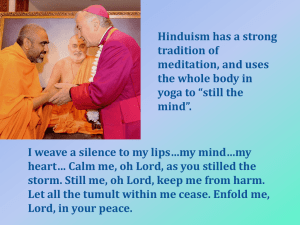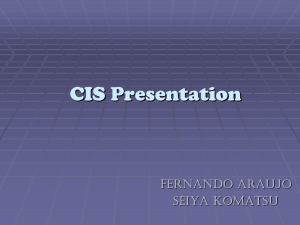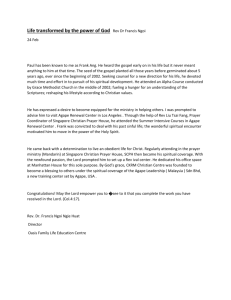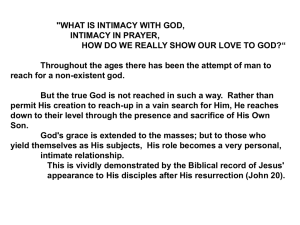book review, lord's prayer
advertisement
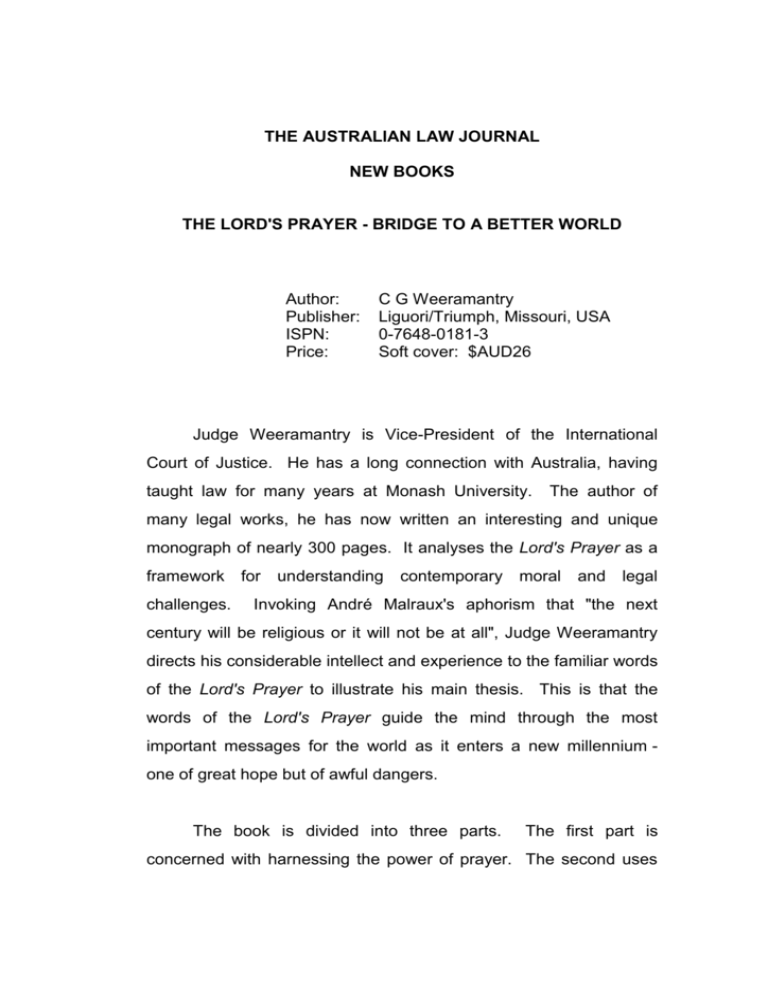
THE AUSTRALIAN LAW JOURNAL NEW BOOKS THE LORD'S PRAYER - BRIDGE TO A BETTER WORLD Author: Publisher: ISPN: Price: C G Weeramantry Liguori/Triumph, Missouri, USA 0-7648-0181-3 Soft cover: $AUD26 Judge Weeramantry is Vice-President of the International Court of Justice. He has a long connection with Australia, having taught law for many years at Monash University. The author of many legal works, he has now written an interesting and unique monograph of nearly 300 pages. It analyses the Lord's Prayer as a framework for understanding contemporary moral and legal challenges. Invoking André Malraux's aphorism that "the next century will be religious or it will not be at all", Judge Weeramantry directs his considerable intellect and experience to the familiar words of the Lord's Prayer to illustrate his main thesis. This is that the words of the Lord's Prayer guide the mind through the most important messages for the world as it enters a new millennium one of great hope but of awful dangers. The book is divided into three parts. The first part is concerned with harnessing the power of prayer. The second uses 2. some of the key phrases to illustrate what the author calls "high roads to world order". The third part is a guide to the 21st Century. The author takes as the signature themes for the second part "trespasses" or "sins" of the contemporary world. He takes as the keys to the next century the invocation "Thy kingdom come. Thy will be done". Judge Weeramantry claims that the book does not purport to present Christian theological or doctrinal orthodoxy. It is therefore fitting that scattered throughout its pages are illustrations of the way in which views of spirituality and morality in Christian teaching find parallels in the other major religious and philosophical systems of the world: particularly Islam, Judaism, Hinduism and Buddhism. Yet despite these allusions, and the claims for the universality of the ideas in the Lord's Prayer, the book necessarily reflects a generally Christian perspective. One of the main points which the author makes concerns the extent to which many old doctrines of the common law and of equity are permeated with Christian principles. It could scarcely have been otherwise given the affinity of the early judges to the Church and the religion, training and social class of English and colonial judges. Judge Weeramantry cites, for example, the way in which Byles J, in the famous case of Cooper v Wandsworth Board of Works (1863) 14 CBNS 180, drew upon the judgment of Fortescue J in The King v The Chancellor of Cambridge (1723) 2 L D Ray 1334. "Even God 3. himself did not pass sentence upon Adam before he was called upon to make his defence, if he had any". One of the most interesting papers at a recent conference on the judicial work of Lord Denning (see (1999) 73 ALJ 229 at 231) was written by Professor Andrew Phang of Singapore. He noted the profound effect which Denning's Christian values had on his judicial opinions. In a secular world and in a multicultural society, judges today, in Australia as in England, must be very wary of making assumptions that the views of a particular religious belief are those of society as a whole or even of "its right thinking members". Otherwise, they may get out of touch, as Denning sometimes did in his late years. The fascinating aspect of Judge Weeramantry's book is the way in which he takes to pieces the familiar text of the Prayer and draws out of virtually every word some insight relevant to the world we live in. Because he is a lawyer trained in the legal and judicial system of Sri Lanka, many of his remarks will have resonances for Australian lawyers. The legal traditions are much the same. Because he sees the rapid expansion of global institutions and international law from his seat in the Hague, his perspective of world problems, and of potential legal and other solutions, is rich and insightful. For me, the most interesting section of the book is the one on the various "trespasses" to which human-kind is heir. This is not 4. because sins are necessarily more interesting than the virtues which we hope will come in the new millennium. It is because of the natural human inclination to think that a reminder to forgive the trespasses of others (and to be forgiven those of ourselves) is concerned with local or personal events, mostly trivial and petty. Weeramantry makes the point that we must now see that our "trespasses" are sometimes of a larger, even global, character. Reading this book in the midst of the Kosovo crisis brought home Judge Weeramantry's thesis with great power. Amongst the modern trespasses which he describes are those to which international law has now turned its attention: genocide, torture, uncontrolled war and violence, sex crimes and kidnapping. A chapter is devoted to "technological trespasses", such as the arm's race, misuse of biological medicine, economic degradation and computerised invasions of privacy. "Economic trespasses" include the global polarisation of the rich and the poor, the manifestations of new economic colonialism, money laundering, the exploitation of cheap labour and the perception of national development in purely economic terms. Judge Weeramantry lists various "attitudinal trespasses and temptations" which bedevil the world: unbridled individualism, monetarism, religious racism, intolerance, nationalism and the complacency which comes with individual and national moral paralysis. There is a chapter on "social trespasses" which are concerned with problems such as slavery, the flood of refugees, the denigration of women, the abuse of children, the neglect of prisoners and so on. To this list one would nowadays add 5. the plight of people living with HIV/AIDS, particularly in poorer countries where they suffer great stigma and the problems of homophobia and drug dependence. An entire section of the book is devoted to the categories of professional ethics in which modern "trespasses" can occur. The largest division of this part relates to legal ethics. It is in this section that the author addresses a problem common to settler societies throughout the world, including Australia. He deals with the way the colonial legal systems responded to the claims of indigenous peoples to land rights. He singles out for special praise the judgment of Brennan J in the High Court of Australia in Mabo v State of Queensland (1992) 175 CLR 1. Indeed, he mentions at the outset of the book the encouragement which Sir Gerard Brennan gave him in the early stages of its writing. Obviously, this is not a book for every lawyer. Those without a religious upbringing or persuasion may prefer to see the topics examined in secular context without the intrusion of the religious framework into which Judge Weeramantry has channelled his thoughts. Yet far from being a book of old style religion, the author's thesis is that the "kingdom of heaven" of which Jesus taught was actually a revolutionary place of personal moral obligations - rather like the world of global human rights, now such a galvanising force in international law. The prayer for our "daily bread" is taken to be a metaphor for economic and social rights. Indeed, the entire text is studied in metaphorical terms to permit Judge Weeramantry to draw 6. together themes which he is uniquely well placed to describe. Even the non-religious reader, therefore, will find in these pages many interesting thoughts about the failures of the century which is closing and the challenges that must be tackled in the century to come. For those brought up in a Christian tradition, the value of the book is that it gives a new dimension to the familiar words of the Prayer. After reading the book, those words will take on new life and embrace new meanings adding to their richness. This is what happens when a creative and experienced legal mind takes a text to pieces. This technique is wonderful to behold when it is seen at work with the Commonwealth Places Act (to take a horrible example). But it is richness itself when it is applied to invocations as old and comfortable as those in the Lord's Prayer. The book is available at The Open Book, 703 Station Street, Box Hill, Victoria, 3128. THE AUSTRALIAN LAW JOURNAL NEW BOOKS THE LORD'S PRAYER - BRIDGE TO A BETTER WORLD Author: Publisher: ISPN: Price: C G Weeramantry Liguori/Triumph, Missouri, USA 0-7648-0181-3 Soft cover: $AUD26
